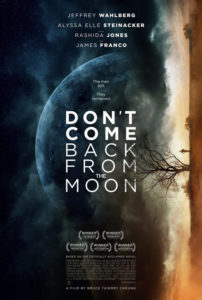The summer Michael Smolij turns sixteen, his father disappears. One by one other men also vanish from the blue-collar neighborhood outside Detroit where their fathers before them had lived, raised families, and, in a more promising era, worked. One man props open the door to his shoe store and leaves a note. “I’m going to the moon,” it reads. “I took the cash.”
The wives drink, brawl, and sleep around, gradually settling down to make new lives and shaking off the belief in an American dream that, like their husbands, has proven to be a thing of the past. Unable to leave the neighborhood their fathers abandoned, Michael and his friends stumble through their twenties until the restlessness of the fathers blooms in them, threatening to carry them away.
Hailed as “a triumph” by O, The Oprah Magazine, this haunting, unforgettable debut novel is for anyone who has ever been left longing.
Movie Adaptation
 Bakopoulos’ beloved first novel has been turned into a “poignant and visually striking” movie starring James Franco and Rashida Jones.
Bakopoulos’ beloved first novel has been turned into a “poignant and visually striking” movie starring James Franco and Rashida Jones.
Mickey, a wayward teenager living on the fringe of the California Desert, is filled with angst. His father has disappeared. One by one other men also vanish from his decaying working class town. One man props open the door to his bar and leaves a note. “I’m going to the moon,” it reads. “I took the cash.”
Mickey tries to escape the bleakness of life by causing trouble with his friends but his rage becomes too much to contain. His rash choices leave him careening towards damaging consequences. Would a budding love relationship be enough to save him?
The lure of just giving up and running away is palpable. Mickey, like his father, face the decision to resist or to heed the call of “heading to the moon.”
Praise For The Book
“Gorgeous, painful, and exquisitely written, Please Don’t Come Back From the Moon is about the impossible things we believe because the truth may simply be too hard.”
The Boston Globe
“By deftly welding magic realism with social satire, Bakopoulos captures the dark side of the working-class dream.”
The New York Times Book Review
“Bakapoulos’ endearing first novel . . . is a tale that, despite the boys’ empty longing, is full of hope.”
People
“ ‘When I was sixteen, my father went to the moon.’ Thus begins this debut novel about the mysterious disappearance of the men from a working-class suburb of Detroit. … Magic serves more as an emotional undercurrent than a mystery in this odd novel, part fable and part gritty realist chronicle. As Bakopoulos writes in an author’s note, the book is a kind of elegy for his father’s generation of downtrodden working-class men, but their disappointments are tempered by the modest hopes and ambitions of their sons in this gentle and moving tale.”
Publisher’s Weekly
“The term ‘heartbreaking’ appears frequently in reviews of this debut novel, whose title is derived from a Charles Mingus jazz composition. With its undercurrent of magic and social satire, Michael’s coming-of-age story struck a strong chord with most critics. The main character is, at times, annoyingly indecisive, but the 12 years of his life presented in this compelling story ring true. Please Don’t Come Back From the Moon should be read as a tribute to the past generation of working-class American men.”
Bookmarks Magazine
“During the summer of 1991, when times were tough, the men of blue-collar Maple Rock outside Detroit disappeared one by one, with one of them leaving a note saying he was going to the moon. The women rage and weep, then start new lives–finding jobs, remarrying, moving to nicer suburbs. But the fatherless sons, among them 16-year-old Mikey Smolij, flounder for years. After an initial period of freedom and licentiousness, during which they take over the local tavern and serve as studs for older women, these teenage boys live with doubt about whether whatever caused their fathers’ disappearances might get them too. Twelve years later, with Mikey’s young adulthood marked by some dwindling relationships and depression, there is a mystical reunion, but how much happiness is possible in the face of a void that is never filled?”
Booklist
Praise For The Film
“The movie’s emotional potency is undeniable, its crescendo of wounded feelings and shimmering photography leaving unexpected imprints on the eyes and heart.”
Jeannette Catsoulis, NY Times
“From its opening moments through its pitch-perfect closing notes, ‘Don’t Come Back from the Moon’ is a stunning and stark and beautiful thing to behold. The direction and the screenplay from Bruce Thierry Cheung are both first-rate”
Richard Roeper, Chicago Sun-Times
“Cheung’s dreamlike drama is fascinating and affecting. The performances, running the gamut from Wahlberg’s implosive Mickey to Steinacker’s feisty but needy Sonya, are pitch-perfect across the board.”
Joe Leydon, Variety
“Poignant and visually striking. Cheung’s unaffected compassion for his characters grows more powerful as it proceeds. The cinematography, with its thick shadows and saturated colors, is fully attuned to the wild beauty of the edge-of-the-world setting. ”
Sheri Linden, Hollywood Reporter
Film Awards
- NEW YORK TIMES CRITICS’ PICK
- SPECIAL MENTION FOR DIRECTING, LOS ANGELES FILM FESTIVAL
- BEST PERFORMANCE IN A FEATURE FILM – ALYSSA ELLE STEINACKER YOUNG ARTIST AWARDS, 2018
- JAMES LYON AWARD FOR BEST EDITING, WOODSTOCK FILM FESTIVAL
- SPECIAL MENTION FOR BEST FEATURE. WOODSTOCK FILM FESTIVAL
- BEST FEATURE FILM, SOUTHAMPTON INTERNATIONAL FILM FESTIVAL
- BEST CINEMATOGRAPHY, SOUTHAMPTON INTERNATIONAL FILM FESTIVAL
